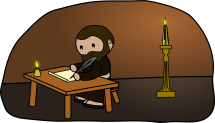
It’s the start of a brand new and exciting year, so I thought I’d do a post on how to start a new story.
When should the story start? What’s the first scene? Should that opening sentence be about your main character or something else?
It can easy to throw up tidbits like “start with a critical moment…” or “open with a scene that forces the character into conflict…” – and these are great pieces of advice – but since they’re quite general/abstract, they can be difficult to get a handle on when it comes to writing a concrete scene.
I flip and flop when it comes to openings. Sometimes, it’s simple.
One of my novels-in-progress starts with a young boy finding a body on a beach. This signifies the changes of everything – in the main character, the other people of the town, the setting and its flow of life.
But in my other novel-in-progress, it wasn’t so easy to find a starting point. It took many drafts to figure out that it starts with the main character, a boy, encountering a book that is literally about to change his life.
So, here are a few simple ideas for openings. They aren’t meant to work like magic. Instead, they’re meant to act as prompts or exercises to help you begin writing, and uncover where your narrative starts.
1. OPEN WITH SOMETHING ESSENTIAL TO YOUR CHARACTER’S STORY
In other words, don’t open with your protagonist. Open with something that’s essential to him/her. You’ve likely got some kind of idea about what’s central to your story – Is it an object? A setting? An animal or a pet?
An entire scene the protagonist is witnessing? Whatever it is, open with it. Think about what’s important to your character. And then see where the narrative takes you.
2. CRAFT A SYNOPSIS
If you’ve got a great idea but are struggling on when to start the story, write your story synopsis first. It shouldn’t be any longer than a few sentences.
This forces you to nut out what elements are critical to the opening of your narrative – and it can show you when and how to begin.
Your synopsis isn’t set in stone, either. You can always change it later on.
3. START IN THE ORDINARY WORLD
This is the first golden rule of the Hero’s Narrative or Journey. Place your character in his/her ordinary world and show them doing ordinary things.
The ordinary world can be established in a sentence, a paragraph or an entire chapter.
But it must contrast and/or set up the journey the character is about to take. Then – throw in something that upsets that world.
4. WRITE THE BACKSTORY
You won’t want to spill your entire backstory on the opening page, but writing the backstory for yourself can have an endless range of benefits – and it can also shed some light on when and how the story should start.
5. OPEN WITH AN EMOTION
Compelling characters experience emotion – they don’t just ‘do’ or ‘see’.
Giving your character an emotion in the opening sentence can help. Such as: “Ryan was feeling ecstatic” or “Natalie was feeling depressed.” This isn’t meant to be your opening sentence, but it can be a great prompt or trigger to help you figure out why the character is feeling this emotion.
And when you start writing about that, you can find it will throw you into a scene or dilemma.
Once you’ve got that down, you can then go back and rework that first sentence.
6. START WITH YOUR ENDING (IF YOU KNOW IT)
Beginnings and endings are tied together in every way imaginable. If you can’t figure out how to open your story, write your ending.
This could mean your last paragraph, page or chapter.
Even your last sentence. If you look closely enough, it’ll tell you when and how the story is meant to start… Craft your beginning on your ending.











